Following the successful conclusion of China’s Two Sessions, Peking University’s Guanghua School of Management held its “2019 PKU Executive Program for Senior Diplomats: China’s Economic Development” from March 19-21st.
The Executive Program for Senior Diplomats is a key initiative of Peking University’s “Belt & Road” Institute to promote international dialogue. It aims to systematically document and share theories and practices for development that have been gleaned from China’s experience over 40 years of reform and opening up, analyze the current state of China’s economy, and provide policy recommendations to spur healthy economic and social development into the future. By bringing in world-class faculty from the Guanghua School of Management to share the in-depth story of China’s economic and social development, the Program enables diplomats to better identify ways in which their countries might benefit from China’s development experience and to recognize cooperation opportunities brought about by the “Belt & Road” initiative.
The course received a positive response from the embassies across China, and after strict screening, a total of 60 high-level diplomats were admitted, including 16 ambassadors. Participants included diplomats from the EU Delegation to China and embassies from 36 countries, including Britain, Spain, Italy, Australia, Iceland, Myanmar, Belarus, Mexico and Egypt.
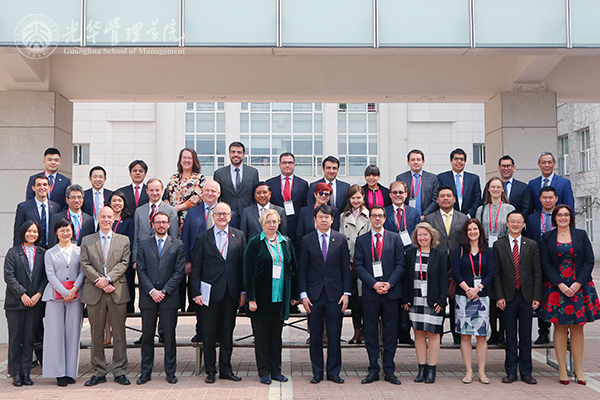
Group photo of some of the participants in the Second Peking University Guanghua Executive Program for Senior Diplomats
Analyzing China’s Economic and Social Development
Based on the backgrounds and needs of diplomatic missions, Guanghua has carefully designed a tailored training curriculum covering both ends of multiple political economic dichotomies, including both macro-level and micro-level economic analyses, central government and local government roles in governance, and master planning and industry-specific planning. The program was broken down into four modules:
The first module used the Two Sessions as an indicator of the trajectory of China’s economy and dissected key issues related to China's continued development. During this module, four professors from Guanghua examined China’s macroeconomic trends, digital transformation, fiscal and taxation policies, changes in consumption, and economic reform in light of the country’s recently-concluded Two Sessions.
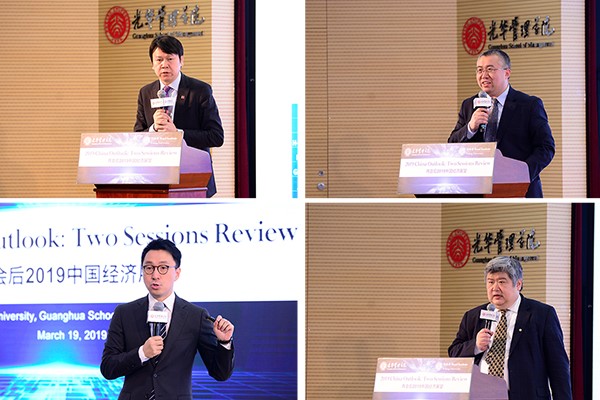
Dean of Guanghua School of Management, Professor of Finance, Liu Qiao (upper left), Associate Professor of Applied Economics, Guanghua School of Management, Deputy Director of Peking University Institute of Economic Policy Yan Se (upper right), Associate Dean of Guanghua School of Management, Professor of Marketing, Zhang Ying (Bottom left), Vice President of Guanghua School of Management and Professor of Finance Jin Li (bottom right) gave keynote speeches at the "2019 China Economic Outlook" after the two sessions
The second module sought to define China’s development path under the conditions of new globalization. Tang Yao, Associate Professor in the Department of Applied Economics at Guanghua, focused on "new globalization and China's economic growth" and explained to diplomats the various factors and phenomena that will influence China's economic development under the backdrop of globalization in its changing form. Wu Changqi, Professor of Organization and Strategic Management, provided an overview of industry and economic development zones and the ways in which these zones have contributed to China’s economic progress.
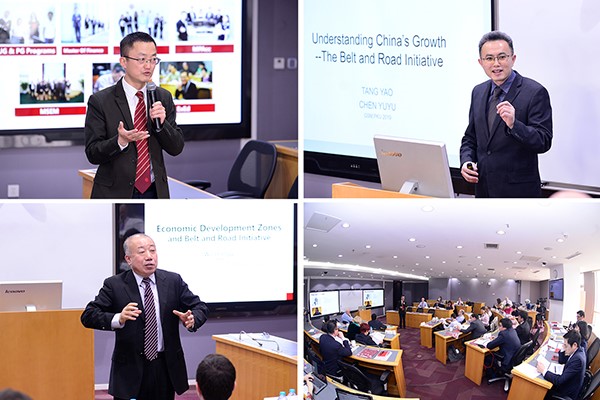
Professor Ma Li (first left), Academic Director of the Diplomat Program, gave a welcome speech. Associate Professor Tang Yao (upper right) and Professor Wu Changwei (below left) taught diplomats
The third module focused on the “Chinese characteristics” inherent in China’s development model. Xu Xianping, Guanghua Distinguished Professor, Counselor to the State Council, and former Deputy Director of the National Development and Reform Commission, provided a comprehensive overview of China's macroeconomic system, development model, and the strategies it formed throughout 40 years of reform and opening up. He also shared his rich first-hand experience in formulating and implementing national development strategies. Zhou Li-an, Associate Dean and Professor of Economics at Guanghua, explained the “Chinese Characteristics” in China’s development from the perspective of local-level governance structures and incentive mechanisms, providing a political economic explanation for China's rapid economic growth. The module concluded with a case study presentation by Zhang Yanlong, Associate Professor in the Department of Organizational and Strategic Management, on the Ningxia Helan Mountains wine industry, which used lectures, a film documentary, a dialogue with the chairman of a winery, and on-site wine tasting to provide an interactive learning experience.

Professor Xu Xianping Distinguished Professor (upper left), Professor Zhou Li'an (upper right), and Associate Professor Zhang Yanlong (below left) taught diplomats
The fourth module provided a forward-looking analysis of China’s economy and explored new trends in the country’s development. Liu Qiao, Dean of Guanghua and Professor of Finance, presented his research on "high-quality development". His examination of Chinese enterprises provided insight into the economy’s micro-foundation from the perspective of corporate investment capital return rates and created a logical framework explaining how the Chinese economy has continued to grow. Focusing on the application of technological innovation in economics and finance, Professor of Finance Liu Xiaolei discussed the future development of financial technology in China. Su Meng, Founder of big data and artificial intelligence firm Percent, highlighted information technology’s important role of China's economic development and social progress.
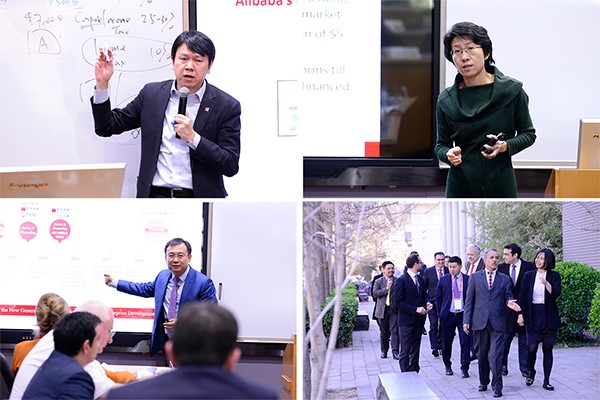
Professor Liu Qiao (upper left), Professor Liu Xiaolei (upper right), and Su Meng Research Professor (bottom left) taught the students
Actively-Engaged Students
During the three-day program, diplomats immersed themselves into course content, eagerly asking questions and actively interacted with the professors. They shared their appreciation for the quality of professors’ teaching and insights, indicating that the Program was valuable for giving them a timely understanding the Two Sessions and the Chinese economy as a whole. Keeping in line with Peking University and Guanghua’s historical commitment to outstanding scholarship, the Guanghua professors who gave the Program’s lectures combined the results of their long-running research with empirical cases to provide comprehensive, fact-based analyses of China’s economy. The experience and knowledge gained at Guanghua will enable the participating diplomats to more effectively contribute to the communications and cooperation between their respective countries and China.

Diplomat students focused on listening, taking notes, and interacting with the instructors
Over the course of the Program, many ambassadors shared their specific takeaways. Ambassador of Columbia to China Luis Diego Monsalve Hoyos joined Guanghua to participate in this Program after only five days after arriving in China to assume his post. He understood that learning about China’s political and economic development was crucial and expressed that this course laid a good foundation for him to better serve the development of Colombia-China relations.
For the Ambassador of Costa Rica to China Patricia Rodriguez, this was her second year participating in the program. She believed that this course would help her to keep up with the rapid changes taking place in China. She was very much looking forward to the topics on innovative technologies and new economy presented during the Program. Guanghua's professors’ analyses of the development of China’s smart economy, big data and other cutting-edge technology had brought her new inspiration.
Ambassador of Bulgaria to China Grigor Kalinov Porozhanov believed that the Senior Diplomat Program was a pioneering undertaking of Guanghua. Each course had been carefully selected and arranged to truly reflect the current economic development of China and benefited him greatly. Guanghua's team of professors had insights and analysis of the past and present during the lectures. The professors also looked to the future, focused on the long-term development and paid attention to the long-term development trends. He was inspired by their academic strength and foresight.
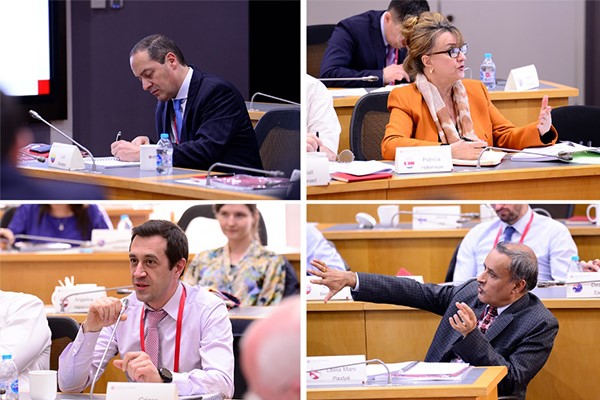
The ambassadors in China were actively involved in the classroom
The lecture "2019 China Economic: Two Sessions Review" left a deep impression on the the Ambassador of Myanmar to China, U Thit Linn Ohn. He said that China’s Two Sessions had just ended, and this lecture provided a good opportunity for diplomats in China to understand the Chinese economy in a timely manner. Ambassador of Iceland to China Gunnar Snorri Gunnarsson also said that Professor Liu Qiao’s outlook on the year 2035 was an impressive part of the lecture. In particular, he mentioned the analysis on long-term challenges faced by the Chinese economy gave him a deeper understanding of China’s development trajectory for the next 15 years.
Ambassador of the Republic of Lithuania to China Ina Marčiulionytė and Ambassador of Nepal to China Leela Mani Paudyal both believed that the content of the Program was closely related to their work as diplomats. Ambassador Marčiulionytė said that Lithuania played a leading role in the European financial technology industry and was the leading country for financial technology cooperation as part of the 16+1 framework (including China and 16 Central and Eastern European countries). Professor Liu Xiaolei's content related to the China's growth of China’s financial technology sector provided valuable information.
Ambassador Paudyal appreciated Professor Wu Changqi’s multi-country research experience. He felt Professor Wu’s explanation of China’s experience in constructing special zones and facilitating cooperation between Chinese and foreign zones provided inspiration for promoting better Nepal-China cooperation. In addition, the discussions surrounding big data development, industrialization, technological innovation and financial technology were of great practical significance to his work.
 Programs
Programs